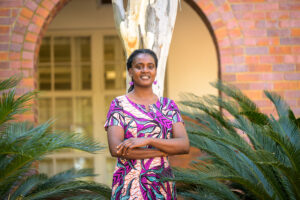Championing African Legumes for a Sustainable Future
Sarah Kandolo recently graduated with a master’s degree in food science from the University of Pretoria, supervised by Co-EFS Principal Investigator Professor Mohammad Naushad Emmambux in the Department of Consumer and Food Sciences. Sarah’s research explored how two traditional African crops; Bambara groundnut and cowpea, could be used to develop plant-based protein ingredients that offer a more sustainable and locally rooted alternative to popular options like soy and pea protein. Her project highlights the role of African crops in solving global food and climate challenges.

Photo by EYEscapes
A Journey Rooted in Culture
Sarah’s journey began at UP when she enrolled in the General BSc extended programme to build her confidence in core subjects before moving to the main Hatfield campus. It was there that her personal curiosity about traditional African foods found a scientific outlet.
“The moment I stepped into the old agriculture building, I felt at home: the department’s vision to position African food research on the global stage spoke directly to my interests.”
Her connection to the work was deeply personal. At home, traditional dishes like cassava stews, legumes, and leafy greens were a source of strength and health.
“Growing up, our meals always included traditional dishes, cassava-based stews, hearty legumes, and an array of leafy vegetables. My parents and grandparents often reminded me how these foods, rich in nutrients, protected us from malnutrition. To this day, none of us suffered chronic illnesses, and I credit our diet for that good health. Yet, when we went grocery shopping, I rarely saw the ingredients I had grown up eating on supermarket shelves – and I could not help but wonder why.”
Sarah was concerned that the foods that kept her family well were almost invisible in mainstream spaces. Informed by this experience her research focused on four legume varieties: red and cream Bambara groundnut, and two types of cowpea. She used two methods to extract protein from the legumes, wet milling and a simple alkaline process that separates protein using changes in pH and then analysed the resulting ingredients to understand their nutritional quality and how well they might work in food products.
African Legumes Matter, Now More Than Ever
Sarah tested how much protein they contained, what kinds of amino acids they had, how they behaved in water or oil, how they foamed or formed emulsions, and how they flowed or thickened in different conditions.
Among other findings she discovered that the legumes were rich in a type of protein called vicilin, which makes them dissolve easily in water and suitable for use in products that need a lighter, smoother texture. This could make them ideal for things like shakes, beverages, or soups. For Kandolo, though, the science was always about more than numbers.

Photo by EYEscape
Climate, change resilience and the need for new plant-based protein.
“It unsettles me that these nutrient-dense, low-maintenance crops, so well suited to our climate, are still labelled ‘underutilised’ and overlooked.”
These crops are tough. They grow well even in poor soil, don’t need much water, and help rebuild soil health by fixing nitrogen. That makes them ideal for African farmers dealing with climate change, facing hotter temperatures and more erratic rainfall.
“My goal is to remind us that these legumes have sustained our ancestors for generations, and they remain just as valuable today.”
Unlike soy and pea, which often rely on large-scale farming and irrigation, Bambara groundnut and cowpea can thrive with fewer inputs. They’re low-cost, low-risk, and already part of many local diets.
“Compared to soy and pea these legumes are resistant to environmental changes, including poor soil and drought conditions, which makes them suitable food sources in most African countries.”
Her work comes at a time when demand for plant-based protein is booming. Consumers are looking for options that are healthier, more ethical, and better for the planet. Livestock farming is a major contributor to climate change and deforestation, and allergies to soy and pea are on the rise. People want alternatives.
“City dwellers need convenient, fast-growing crops that thrive under changing conditions, require minimal water, and align with the United Nations’ Sustainable Development Goals.”

Photo by EYEscape
The Centre of Excellence in Food Security played a key role in helping Sarah realise her research through funding and access to world-class labs but also supported her with the chance to grow as a young scientist through mentorship, training, and networking opportunities.
“The Centre did not just fund my work, it opened doors. Through their events and collaborations, I met fellow researchers, policy experts, and food industry professionals, gaining a deeper understanding of the challenges and possibilities within the food system.”
Sarah’s research is a powerful reminder that African crops, often sidelined in mainstream agricultural narratives, have enormous value.
“These legumes are more than ingredients; they are a legacy of resilience, a solution for food security, and a vital part of our climate-smart future.”
Her work powerfully makes the case that answers to global food challenges might not lie in new technologies or imported solutions, but in remembering what has always grown here and giving it the recognition it deserves.



